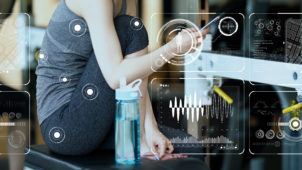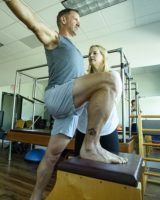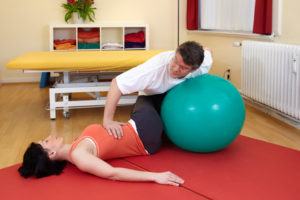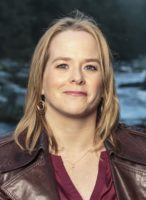It’s Time To Redefine Fitness
It’s time to redefine fitness. What does “fitness” mean to you? To you, specifically. I’d love to know. Is it having an ability to do certain things? Is it about how you look, or how much you weigh, or how much energy you have? Maybe it’s a combination of these? How do you measure for yourself whether you’re fit, or not? Can you ever be fit enough? Is whatever you’re doing right now to “get fit” serving your life well? Is it taking you where you want to be? Can you move fully and confidently through all the things you do, or would like to do, in your life?
Here’s Why
I think it’s time to redefine our concept of what “fitness” is. Just as health is a a lot more than the absence of illness, fitness is about more than the strength of your muscles, your body fat percentage or your ability to do Instagram-worthy athletic tricks. All those things do indicate some degree of fitness, but do they really tell us anything about the quality of our lives? If we use only the risk assessment model of healthcare to define fitness, what becomes most important is the data and the numbers – not the individual. The better your numbers are, the smaller your risk of dying from the big scary diseases. Heck, your extended health and life insurance rates are probably even better.
 I’m not disputing the numbers. They are important. But given that ours is a lifestyle in which you actually have to make a serious effort to get up and get moving, and when we realize that the epidemic of obesity and lack of fitness is GROWING, we have to realize that our current model isn’t really working very well. There is a disconnect, and throwing numbers at people isn’t changing behaviour all that well. What if we expand the parameters and widen our perspectives?
I’m not disputing the numbers. They are important. But given that ours is a lifestyle in which you actually have to make a serious effort to get up and get moving, and when we realize that the epidemic of obesity and lack of fitness is GROWING, we have to realize that our current model isn’t really working very well. There is a disconnect, and throwing numbers at people isn’t changing behaviour all that well. What if we expand the parameters and widen our perspectives?
What can we do differently?
Instead of feeding the growing polarity between couch potato and extreme fitness god, I’d like to find a way to support people in moving in meaningful ways that support and enrich their lives beyond the “fitness” experience. Exercise is important. But if fitness is always something separate from the rest of our lives, it’s easy for it to become just another thing on the to-do list. More often than not, for most people, it gets put at the bottom of that list. Or, people blindly push forward into extremes, putting their bodies at risk, instead of creating a vital and sustainable lifestyle. (To learn about the general symptoms of overtraining, click here. For a wake-up call to extreme athletes everywhere, click here to read an article about rhabdomyolysis).
In past posts, I’ve talked about tuning in to sensation and about paying attention to the quality and sensation of your movement as you work out – no matter what that work is. (See: Sensation – Mindfulness for Moving Bodies) Absolutely push boundaries – that’s the only way to grow. But make them your own boundaries. Make the connection to your own body and how it moves, to your emotions and your intellect. Bodies are not simply vehicles to carry our brains around. Brains and bodies work together, intimately – one affects and is affected by the other. You cannot ignore one and expect the other to function well. Growing numbers of health practitioners recognize this and treat their patients that way. But why wait until something is WRONG? Why not incorporate an integrated approach to fitness and movement training now – before things hurt and before your mobility starts to decline?
Here are a few ways to change things up:
 Quit training muscles A well muscled body can look really good. But the body doesn’t create movement by firing individual muscles. Movement is about patterns. Training individual muscles may be appropriate on occasion, but for the large majority of your training time, train movement. Quality movement in different planes, with varying intensity, load and range of motion. The more different ways you can move well – the longer you’ll be able to keep moving! How you move really does matter.
Quit training muscles A well muscled body can look really good. But the body doesn’t create movement by firing individual muscles. Movement is about patterns. Training individual muscles may be appropriate on occasion, but for the large majority of your training time, train movement. Quality movement in different planes, with varying intensity, load and range of motion. The more different ways you can move well – the longer you’ll be able to keep moving! How you move really does matter.- When you train movement, move WELL. If it feels harder than it should, or you keep trying and you just can’t “get it” – try doing it a different way. There may something getting in the way of your success: a faulty load transfer pattern, a weakness in the chain somewhere, imbalance around a joint – heck it could even be bad imagery or a skewed belief system holding you back. Find a different way in. Just because it’s hard doesn’t mean it’s doing good things for you.
- Fads are fads. Don’t get sucked in. The fitness industry has to keep money rolling in. When people lose interest, they roll out the latest wonder workout to get you moving. Try ’em, enjoy ’em – but remember that your body is more valuable the the protocols behind any trendy new workout. Find what works for YOU. If you’re having fun, adapt the new exercise protocol so that it fits your body – not the other way around. YOU matter.
- Understand that chronic stress may be creating health hazards, including your ability to access fundamental structural support patterns in your body. Even though you may love pushing limits as often as possible; make sure your structure is handling the load well. Do you have to brace and lock up your body to make the movement happen? Do you experience joint pain during or after the activity? Do you feel physically spent a lot of the time?
- Keep pushing your edges. But feel things out – are you hitting a soft edge where there is still some hope for good support and control, or are you hitting a hard edge – where your body is working in survival mode? Know the difference in your own system. Consistently working in survival is not a great way to build sustainable strength. There can be unanticipated costs.
- Have Fun! If there is not at least some element of your physical activity that you enjoy, you probably won’t keep doing it. Consistency counts. If you’re having a good time, it’s much easier to get up and go.
- Incorporate movement into the rest of your life. Instead of grabbing a coffee with friends, why not go for a walk? Take the stairs. Go dancing with friends. Explore your neighbourhood, or get out into nature. Fitness doesn’t just happen in an “exercise” setting. The more you move – the better you think, the easier it is to regulate emotions, the more deeply you sleep and the happier your body! It’s just a matter of changing some habits.
Here’s the Tough Love
For “fitness” to work, you have to take responsibility for your own health. There is no magic pill. No magic workout. You have to pay attention. You have to look inside and tune in to your own body, mind and emotions. You have to ask questions, of yourself and of others. You have to do the work. By all means, find people to educate and support you in the regular practice that improving fitness demands. But you’re the boss. You. Get beyond your drama stories, your excuses, your “stuff”- whatever that is – and connect to who you are and what you want to do in your own moving body. When we redefine fitness for ourselves, we make it more accessible, and we can integrate it into our lives more easily.
Once you start living in your body more fully, and connecting in to your own needs this way – the world becomes a whole different place. A richer, fuller place, where not only are your internal connections improved, but the way you connect to the people in your life and to the world around you changes for the better too.
A Call to Fitness & Movement Pros: Let’s Redefine Fitness
 To my colleagues in the fitness and movement industry – it’s time to up our game. Why don’t we redefine fitness? Let’s look beyond the hour, the class, or the 12 week series. Let’s see each person as an individual. Let’s look at how our people move, not just that they get through the desired repetitions. Does what we’re doing with our clients have any connection to how they move around in their lives? Is it serving them well; beyond the numbers?
To my colleagues in the fitness and movement industry – it’s time to up our game. Why don’t we redefine fitness? Let’s look beyond the hour, the class, or the 12 week series. Let’s see each person as an individual. Let’s look at how our people move, not just that they get through the desired repetitions. Does what we’re doing with our clients have any connection to how they move around in their lives? Is it serving them well; beyond the numbers?
We need to know our stuff, and know it really well. But we have to be prepared to toss it all out if what we’re doing isn’t working. If there’s a “compliance” issue – figure out why! Let’s listen carefully to the words and the stories our people tell us. We don’t have to become a place to dump stress & challenging emotions, but we have to be able to acknowledge that whatever is going on for our clients is having an effect on the way they move. We don’t necessarily have to talk about it, but we need to understand and adapt programs – or maybe just our approach to the work on a given day – where appropriate. In my experience, this is how we build sustainable function and performance for the long haul. We go where you need to go, as long as the client is the priority; not the “fitness” destination.
If the pursuit of fitness can become a way to connect better to ourselves, and our own bodies – and if it opens new possibilities to connecting with others – then it quickly becomes a lot more than a troublesome thing at the end of our to-do lists. When meaning is restored, it’s a whole lot easier to do things, even if they’re hard. So let’s look beyond the stats and define fitness for ourselves.
What does fitness mean to you? If you were to redefine fitness, what would that be, for you? What inspires you to get moving? Have you worked with someone who helped you see new possibilities? Share your thoughts in the comment section below!
About Susannah Steers
 Susannah is a Pilates and Integrated Movement Specialist, and owner of Moving Spirit. Through movement teaching, speaking, and facilitating workshops, she supports people in creating movement practices that promote fitness from the inside out. She loves building community, and forging multi-disciplinary connections. Susannah co-hosts the Small Conversations for a Better World podcast – an interview based podcast dedicated to promoting the kind of conversations about health that can spark positive change in individuals, families. communities and the world.
Susannah is a Pilates and Integrated Movement Specialist, and owner of Moving Spirit. Through movement teaching, speaking, and facilitating workshops, she supports people in creating movement practices that promote fitness from the inside out. She loves building community, and forging multi-disciplinary connections. Susannah co-hosts the Small Conversations for a Better World podcast – an interview based podcast dedicated to promoting the kind of conversations about health that can spark positive change in individuals, families. communities and the world.
If you’d like to explore how Pilates & Integrated Movement Training can provide access to meaningful movement and open access to a healthy mind-body relationship, check out our Getting Started Guide. If you’re ready to jump in now, book an Introductory Private Training Package, or a 10-Class Virtual Mat Pass today. We’d love to get you started.
